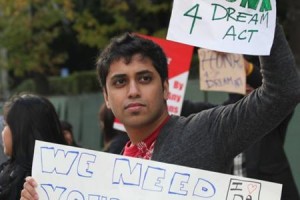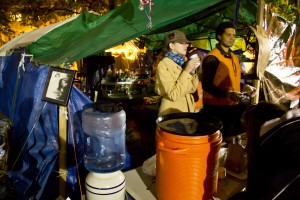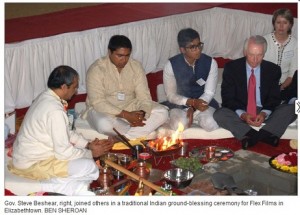There are two million South Asian Americans – at least those were the numbers we had to use and were derived from the 2000 Census. But as we’ve written before, the numbers of the community were suspected as being underestimated in the previous Censuses. The data from the 2010 Census has been slowly release this year and last month the Asian Pacific American Legal Center released their latest report “A Community of Contrasts; Asian Americans in the United States: 2011” (download PDF here) which has a comprehensive national community analysis.
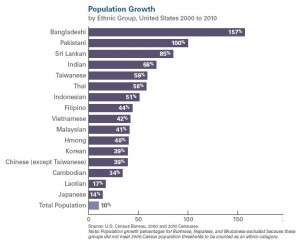 The report covers a wide range of topics such immigration, employment, housing and health. I would like to address in particular the population and civic engagement components that the report discovered in the South Asian community. One of the largest findings is that South Asians are the fastest growing Asian American community; the Indian population is at 3,183,063; the Pakistani population is at 409,163; Bangladeshi population at 147,300; Nepalese population at 59,490; Sri Lankan population at 45,381; and Bhutanese population at 19,439. That brings the South Asian American population close to 4 million with an exact total of 3,863,836 people. The Bangladeshi and Pakistani population literally doubled between 2000 and 2010.
The report covers a wide range of topics such immigration, employment, housing and health. I would like to address in particular the population and civic engagement components that the report discovered in the South Asian community. One of the largest findings is that South Asians are the fastest growing Asian American community; the Indian population is at 3,183,063; the Pakistani population is at 409,163; Bangladeshi population at 147,300; Nepalese population at 59,490; Sri Lankan population at 45,381; and Bhutanese population at 19,439. That brings the South Asian American population close to 4 million with an exact total of 3,863,836 people. The Bangladeshi and Pakistani population literally doubled between 2000 and 2010.
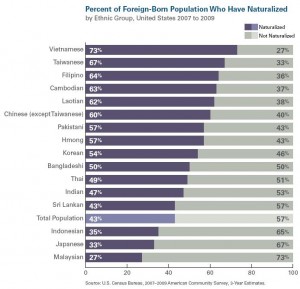 The citizenship rate of foreign-born Asian Americans has also increased, from 50% in 2000 to 57% now. India has one of the greatest number of legal permanent residents eligible to become citizens and 57% of foreign-born Pakistanis have been naturalized. Yet, there are still language and cost barriers associated with citizenship and this remains a hurdle to full civic engagement. Continue reading
The citizenship rate of foreign-born Asian Americans has also increased, from 50% in 2000 to 57% now. India has one of the greatest number of legal permanent residents eligible to become citizens and 57% of foreign-born Pakistanis have been naturalized. Yet, there are still language and cost barriers associated with citizenship and this remains a hurdle to full civic engagement. Continue reading
